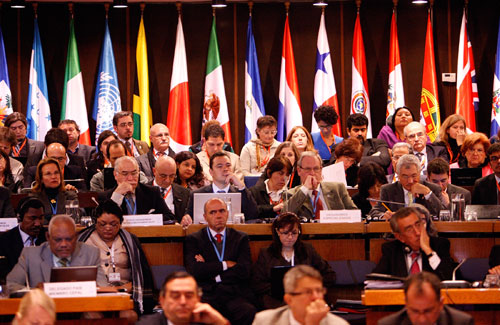Latin America and the Caribbean Conclude the Regional Meeting Preparatory to Rio+20
Topic(s)
Countries will take the recommendations to the world conference to be held in Brazil in 2012.

(10 September 2011) At the closure of the Latin American and Caribbean Regional Meeting Preparatory to the United Nations Conference on Sustainable Development (Rio+20), the ministers and representatives of the Governments in Latin America and the Caribbean, gathered at ECLAC headquarters in Santiago, Chile, agreed that it is necessary to achieve a global institutional framework for sustainable development "which is efficient and flexible and ensures the effective integration of its three pillars (social, economic and environmental)".
The delegates stated that, on the road to the United Nations Conference on Sustainable Development (Rio+20), which will take place in Rio de Janeiro, Brazil, in 2012, a change in patterns of production and consumption must be achieved, in addition to better ways of measuring countries' wealth that adequately reflect the three pillars of sustainable development, "while maintaining the fundamental principles of common but differentiated responsibilities and equity".
Following three days of deliberations, the representatives examined the progress to date since the 1992 Earth Summit and the gaps still remaining as regards achievement of the goals of sustainable development, which are more pressing in the case of the small island States of the Caribbean.
"We leave knowing that an important step has been made in the search for a regional stance that will represent us at Rio, which I am sure will be well received by the various stakeholders in our societies who are concerned about the safe future of present generations and those to come," stated José Luis Balmaceda, Director of Environment and Marine Affairs of the Ministry of Foreign Affairs of Chile and Vice-president of the meeting.
"We wish Brazil every success. ECLAC is willing to help the hosting country in any way," said Alicia Bárcena, Executive Secretary of ECLAC.
In relation to the meeting, she stated that it has been a pleasure for ECLAC to accompany them during the preparatory process. "We will prepare a report in which will include the words of all who participated in this meeting," she said.
In the document with the conclusions of the meeting, the delegates stated that "some of the barriers to the achievement of sustainable development are the scientific and technological gap, the lack of sufficient financing and the fragmentation in implementation".
They also indicated the need to achieve "the eradication of extreme poverty; new, additional, stable and predictable financing for supporting implementation activities in developing countries; the fulfilment of mitigation and adaptation commitments in relation to climate change and the building of resilience to its impacts; and greater South‐South cooperation and exchange of successful experiences".
They included the need for "full implementation of the right to access to environmental information, participation and justice enshrined in Principle 10 of the Rio Declaration on Environment and Development".
Furthermore, the representatives of the States of Latin America and the Caribbean expressed their firm determination to continue to work towards sustainable development, with the primordial purpose of eradicating poverty and achieving equality in our societies, bearing in mind the particular characteristics of each of the States of the region.
They reaffirmed the commitment of the countries of the region to continue to contribute constructively to a successful outcome of Rio+20 and they thanked ECLAC for its constant efforts and the support it extends to the countries of the region.
See also:
Any queries should be addressed to the ECLAC Public Information and Web Services Section. E-mail: dpisantiago@cepal.org; Telephone: (56 2) 210 2040.
Follow us on: Twitter, Facebook, Flickr and YouTube.
Related content

Countries of Latin America and the Caribbean Seek a Regional Consensus On Sustainable Development
Agencies of the United Nations presented a document proposing a strategy for the conference which will take place in Brazil in 2012.
Country(ies)
- Latin America and the Caribbean
-
Brazil
-
Chile
Contact
Public Information Unit
- prensa@cepal.org
- (56 2) 2210 2040